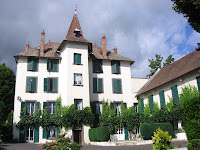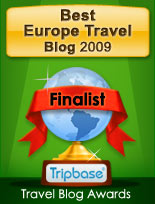Camera fatigue is where I find myself today, which might come a shock to those who know me best. After all, I'm usually the one who can't put the camera down and annoys all her friends by taking pictures of them and everything around them all the time (they'll thank me later). But after nearly six months in a foreign country, after countless weekend trips and casual walks around Paris, I'm kind of worn out. During a recent trip to the Musée Rodin sculpture garden, I couldn't even get excited about taking a picture of The Thinker. That's when I knew I had hit rock bottom.
So, how does one pull oneself out of a travel picture slump? I think it has something to do with how you go about your picture-taking in the first place. Try not to take the classic must-have shots of things that are best seen with the naked eye. I mean, seriously, are you going to look through your travel album 10 years from now and be really happy to see a picture you took of the Mona Lisa? You can see that in any old art book. And the memory of seeing it in person - the five or so minutes you took to really examine the art - is no doubt more magical than the flat look of a tiny little painting in a photo. Stick to the stuff that creates memories rather than hinders them; the stuff that tells a story. For example, I know I will always cherish my photos of the Eiffel Tower that I took on Bastille Day. They weren't just regular shots of a familiar monument. Instead, the changing looks tell a story of that day: what the weather was like, how the sky looked, where I was sitting, and the fireworks that capped the event.
 After exiting the Musée Rodin, I noticed that a number of telephone poles, fence railings and street lights were covered in the multi-colored stickers you get when you buy your ticket at the museum. For some reason or another, thousands of visitors have decided to discard their adhesive passes on the surrounding urban landscape. Art creating art, in a way. Here was a moment I could get excited about! I quickly snapped a picture of a nearby stoplight covered in stickers. 10 years from now, this silly photo will make me think of that hot Paris day spent in the Rodin gardens, and I'll be really happy to have it.
After exiting the Musée Rodin, I noticed that a number of telephone poles, fence railings and street lights were covered in the multi-colored stickers you get when you buy your ticket at the museum. For some reason or another, thousands of visitors have decided to discard their adhesive passes on the surrounding urban landscape. Art creating art, in a way. Here was a moment I could get excited about! I quickly snapped a picture of a nearby stoplight covered in stickers. 10 years from now, this silly photo will make me think of that hot Paris day spent in the Rodin gardens, and I'll be really happy to have it.

































